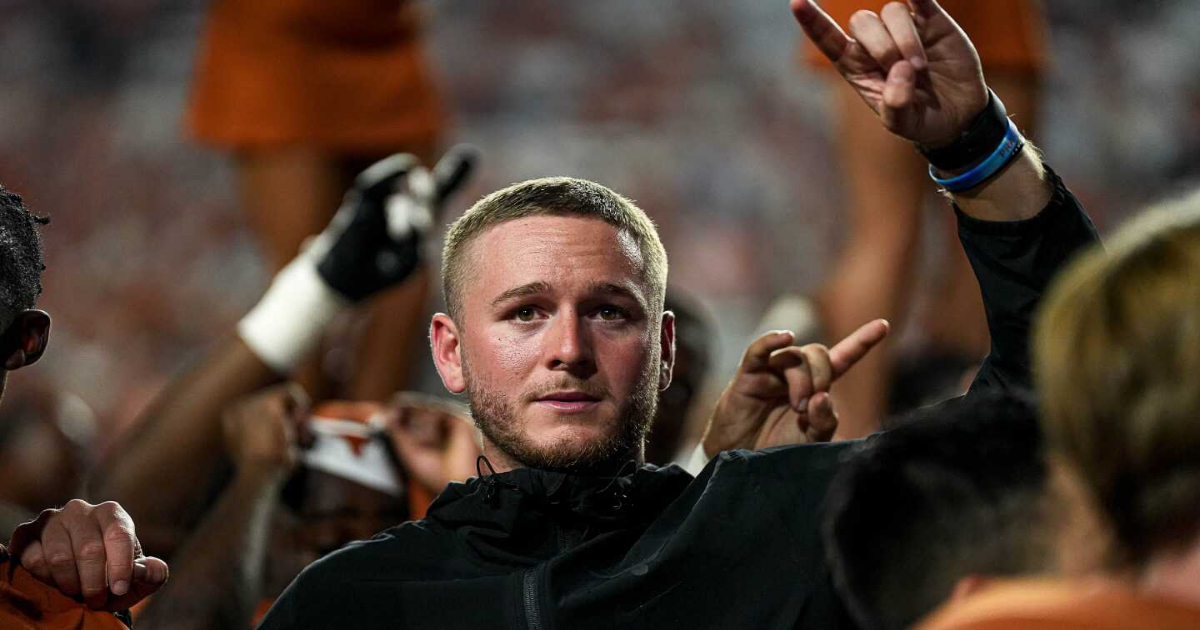The Shedeur Sanders saga extracted most of the oxygen from the NFL draft apparatus over the weekend, and rightfully so. But Sanders’ fifth-round selection wasn’t the only notable slide for a big-name quarterback.
Quinn Ewers, the starting quarterback for the Texas Longhorns in back-to-back College Football Playoff appearances, came off the board even later. He didn’t hear his name called until the seventh round, when he went 231st overall to the Miami Dolphins. The former five-star recruit had done all he could for the Longhorns over his three years there — and someone named Arch Manning is waiting in the wings to take over in Austin, so the timing made sense for Ewers to leave. But … he also had a history of injuries and a year of eligibility remaining.
Ewers would have been better off entering the transfer portal instead of entering the NFL draft.
You could make the case based on money alone, and many are. He would have almost assuredly made more money in NIL deals than he will as a seventh-round pick. The No. 231 draft slot is estimated to have a value of $4.3 million over four years. It’s possible he could have commanded a deal to earn $4 million (or more) as a transfer — in just one season. Had he entered the portal back in December with so many blueblood programs searching for new starting quarterbacks, it’s quite possible he would have cleared the $4 million benchmark set by a less accomplished quarterback (Carson Beck).
2025 NFL Draft biggest winners
From the 49ers to the Patriots, Mike Florio and Chris Simms draft the teams who won the 2025 NFL Draft.
But the reason many of us (including me) are questioning Ewers’ decision to go pro is not just about the money. I would never argue that a player should chase the biggest possible payday over any other factor — fit, development, family reasons, etc. And I understand that he grew up rooting for the Longhorns and was happy to conclude his collegiate career at Texas. He’d helped bring the Longhorns back to national relevance, and he’d taken the team to the CFP semis twice. His legacy was set in stone. Hell, even if Ewers had transferred elsewhere for one final season, it’s easy to imagine that Texas fans would have happily rooted for him from afar. We’ve seen it happen plenty of times in the modern era of college football.
But was Ewers truly ready to go to the NFL? Was his draft stock as high as it would ever be?
Difficult, honest answers to questions like those are what drive players’ decisions to return to college, even when they are so, so close to achieving their lifelong dream of playing in the NFL. They want to be best-positioned for success in the league — so they go back to school (or go to a different school) to address weaknesses in their game. A dual-threat quarterback might pick a more pro-style offense to show scouts he can succeed in that kind of system, too. An injury-prone player might just want another chance to stay healthy and perform closer to his ceiling. We celebrate players — like Cam Ward, who just went No. 1 overall after entering and withdrawing from the draft a year ago — who return to school, develop their game and improve their draft stock.
Ewers obviously did not want nor expect to be a seventh-round draft pick. He did not expect to be the 13th quarterback off the board — or the 14th, actually, if you count Montana State’s Tommy Mellott as a quarterback instead of a receiver. Despite being a significantly more gifted passer, Ewers was drafted behind Riley Leonard and Graham Mertz.
Heading into the draft, NBC Sports NFL analyst Chris Simms listed Ewers in his third tier of QB prospects alongside Syracuse quarterback Kyle McCord, the nation’s leading passer last season. The Athletic’s Dane Brugler gave Ewers a third-round grade and considered him the sixth-best quarterback in the class.
But that’s not how NFL scouts and front office personnel ultimately viewed Ewers — even compared to his peers in what was considered a weak quarterback draft class. That is the tough pill to swallow. That’s why you wish he’d had access to a crystal ball and could see that seventh-round selection coming months ago, so maybe he could have made a different decision.
It is, unfortunately, too late now.
